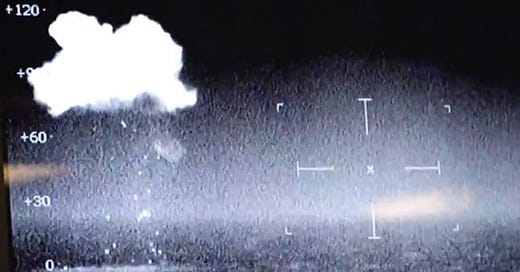A professional studies the lessons from small wars in order to ensure you are ready when the next big wars comes. The Second Boer War and the Spanish Civil War are just two such examples.
There is a parallel human condition in the profession or arms as old as written history; in peace never properly testing and evaluating weapons such that when wars come, arrows don’t shoot true, cannons blow up, ammo unreliable, and torpedoes don’t hit their targets.
Thanks to our European allies and recent events in the Red Sea, we have a great example of both.
The Danish frigate Iver Huitfeldt, which was recently active in the Red Sea, suffered serious technical problems while the ship was under fire. Technical problems prevented the ship from launching missiles for a while and there were also problems with the cannon's grenades. The Danish website Olfi reports this based on a leaked message from the commander of the frigate. According to the report, the problems had been known for a long time and nothing was done about them. The ship is currently sailing through the North Sea and is on its way home earlier than expected.
…, on March 9, the Iver Huitfeldt had suffered an attack by four drones. That Saturday night around 4:00 am, the Iver Huitfeldt spotted a drone heading towards the ship and nearby ships. The Danish frigate shot down the drone and in the hour that followed, managed to shoot apart three more drones.
The ship's commander, Kommandørkaptajn Sune Lund, was quoted as follows by the Danish Defense Force afterwards : "I feel a lot of enthusiasm and relief from my crew that they could act professionally against a serious threat like this, and as ship's commander I am very proud on their efforts. It gives me confidence in the future handling of tasks here."
As anyone who has worked with the Danish military in general, and the Danish Navy in particular, we have good, well trained Sailors in the finest tradition of the Danish Navy in combat (see them in action here).
The issue isn’t their Sailors’ combat performance - but as we see in our navy as well - what is being done at peace by the shore leadership and politicians to ensure that when the shooting starts that their Sailors’ bravery is backed up by properly equipped and supported weapons and sensors to ensure their success?
That Iver Huitfeldt would successfully repel the attack was not at all certain that night. According to the commander's message that Olfi published, an issue between the Dutch APAR radar and the Danish C-FLEX Combat Management System (CMS) prevented the ship from launching the ESSM missiles. The problems were said to have been caused by a "token issue", but the exact cause was not known. The problems lasted for half an hour.
30-minutes is a long time at war when your stuff won’t work. Memories of the USS South Dakota (BB 57) in the Second Naval Battle of Guadalcanal comes to mind.
Ivar Huitfeldt also ran into apparent problems with ammunition quality. It successfully downed the drones with its 76mm deck gun, a common auto-feeding model that is used by navies worldwide. But about half of the proximity-fused rounds exploded just after leaving the muzzle, and never reached anywhere near the drones, according to the CO.
"All shells in standard combat equipment are more than 30 years old, they have been retrofitted with a '2005 proximity fuze' . . . which appears to be unsuitable for actual combat," he wrote.
Since the warship had to use far more of these shells to down the targets, the CO warned that the Huitfeldt risked running out of ammunition at an inopportune moment, potentially reducing the ship's survivability.
Insert additional comment about the ability to rearm and repair at sea … but even the US Navy, to its great disgrace, no longer has destroyer tenders…so…there you go.
Ivar Huitfeldt was expected to remain in the Red Sea through mid-April, but by March 25, she had transited the Suez Canal and arrived at Souda Bay, Crete. After resupply and shore leave, Huitfeldt returned to Denmark, arriving earlier this week.
Let the finger pointing begin.
Thales has sent DR a short statement following the investigation by FMI: "Thales has been informed that the preliminary investigation by FMI, based on the available data from Iver Huitfeldt's systems, on the event during a combat situation in the Red Sea, does not indicate a problem with the APAR radar."
How many times has this problem been seen on the range? Yes or no, either answer brings all sorts of other questions.
How many times has this ship been to the range and fired her weapons at realistic targets? When heading to a range period, are the weapons fired from the ship’s magazine as she would take to war, or were they cherry picked, pampered, hand-selected examples?
There is nothing wrong with getting the most use out of older weapons, as we will see in the Encore FbF coming up tomorrow, but they have to be properly maintained and the crews must have a realistic expectation of their use.
How many times has ‘Ole Sal told you the last two decades that when war comes, you never have enough AAW weapons or enough multi-purpose guns, or a sufficiently layered defense?
The commander emphasized that the ship needs a lot of ammunition to eliminate targets and will quickly run out of ammunition supplies. He also reported that this "severely reduces combat effectiveness and also reduces the ship's survivability."
…
The commander added in his message: "Our clear understanding is that the issue has been known for years without the necessary sense of urgency to resolve the problem. This sense of urgency is critical to building confidence in both the weapon and sensor suites of the frigates and the combat management system . A description of the various problems encountered will be sent as soon as possible."
…"Pending a (better) explanation for this occurrence, I must emphasize the critical and unacceptable nature of sending a frigate to a enemy environment with ammunition consisting of these types of unstable fuses."
Just damning.
I hope the Danish Navy does a better job holding its senior leadership ashore accountable than the US Navy does. So far, it appears so.
The frigate's technical issues have turned into a political firestorm for Denmark's government. The defense minister, Troels Lund Poulsen, first learned of the problem when media inquired about it on Monday night, according to DR. He has relieved Chief of Defense Gen. Flemming Lentfer of command, effective Wednesday.
BZ to the Danes … but there is a caveat here.
Also, heal thyself.
As the wages of sin is death, so are the wages of underspending on your navy;
Danish Navy insiders told DR that the crew of the Huitfeldt had had to borrow the 76mm guns for their warship from other frigates before departure, and could not rule out that this may have increased the risk of a malfunction.
A Potemkin Navy, in a fashion.
You do what you need to do with the money you are given.
Again, I’ve served with the Danes at sea and ashore in Europe and Afghanistan. They are exceptional professionals, and like the Brits and Estonians, fought with us relatively caveat free.
Their political class though? They are not backing up their military.
Money matters. This is just an operational example of how.
We’ve all laughed at some of the range periods we’ve been to; highly scripted with augmented and stationary targets in a permissive environment with - some services worse than others in some shockingly important mission areas that we won’t discuss on this net - carefully selected and prepared examples.
From the performance of the US Navy’s Aegis destroyers in the Red Sea the last few months - at least the Surface Force AAW cadre has been doing things right. BZ to them! The French and Brits - at least from what has made it in to open source - also seem to be doing well. The Germans had a spot of bother you can read about in the links above, but it does not appear to be the same as the Danish problem.
From a NATO perspective, it appears we need to pay a lot more attention to what we are taking to sea. Hopefully from VACAPES to the North Sea, this experience will force everyone to ask very hard questions - and demand more rigorous range time - for the weapons and systems our Sailors and their nation and alliances rely on to perform at war.
If it can happen to the Danes, it can be hiding in anyone’s navy.






The Danish don't mess around.
https://cphpost.dk/2024-04-04/news/defence-minister-fires-chief-of-defence/
Danish Defence Minister fires Chief of Defence
Using Google Translate, apparently the Chief failed to send the details up the civilian chain. https://policywatch.dk/nyheder/christiansborg/article16986836.ece
Having 76mm shells detonate after leaving the muzzle must be a thrilling sight from the bridge. Especially at night. I hope they got video...
Seriously, that had to be a known fault up and down the CoC